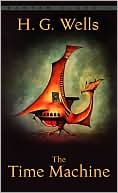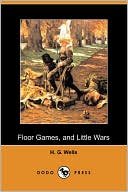 As
least as early as 1914, one man looked beyond the scientific
advances of his day – foreseeing not merely the atom
bomb but the world it could create, tottering on the brink
of destruction or salvation. As
least as early as 1914, one man looked beyond the scientific
advances of his day – foreseeing not merely the atom
bomb but the world it could create, tottering on the brink
of destruction or salvation.
In The
World Set Free, published in 1914, H.G. Wells chose
the happier ending. The terrible power of the “atomic
bombs” in his novel force the world to unite in a single
government dedicated to “a permanent and universal pacifism.”
 It
was an outcome suited to Wells' own pacifist nature. Born
Sept. 21, 1866, in Bromley (Kent County in England), Herbert
George Wells is considered the third Father of Science Fiction,
a trinity that includes Jules Verne and Hugo Gernsback. It
was an outcome suited to Wells' own pacifist nature. Born
Sept. 21, 1866, in Bromley (Kent County in England), Herbert
George Wells is considered the third Father of Science Fiction,
a trinity that includes Jules Verne and Hugo Gernsback.
Like
Verne, Wells didn't confine his writings to “science
fiction” (a genre name coined, in fact, by Gernsbeck
in the 1920s). “Bertie,” as his family called
him, wrote contemporary novels, history, political and social
commentaries – even text books and rules for war games
– in addition to his (now) better known SF stories.
 He
was largely self-educated. The son of a lower middle class
family – his father a former domestic gardener, shopkeeper
and pro cricket player; mother a former domestic servant –
he turned to books for escape when an accident in 1874 left
him bedridden with a broken leg. The family's shop did not
do well, and what little income Wells' father earned appears
to have come from the cricket games. He
was largely self-educated. The son of a lower middle class
family – his father a former domestic gardener, shopkeeper
and pro cricket player; mother a former domestic servant –
he turned to books for escape when an accident in 1874 left
him bedridden with a broken leg. The family's shop did not
do well, and what little income Wells' father earned appears
to have come from the cricket games.
Bertie
tried his hand as a draper and, later, chemist's assistant
but had no success with either. He briefly became a “pupil
teacher” – a senior student who taught the younger
pupils. But attempts to obtain a degree eluded him until 1890
when he earned a Bachelor of Science degree in zoology from
the University of London External Programme.
 Wells'
socialist political views come to the fore in The Time
Machine, published in 1895 – not his first work
but among his best-known. The Time Machine introduced
the concept of time travel to the reading public, but for
Wells, the vehicle is only a device to take his protagonist
to a distant future in which humanity has split into two warring
groups: the elite ineffectual Eloi, descendants of the leisured
classes of Wells' day, and the brutish light-fearing Morlocks,
descended from the downtrodden working classes. Wells'
socialist political views come to the fore in The Time
Machine, published in 1895 – not his first work
but among his best-known. The Time Machine introduced
the concept of time travel to the reading public, but for
Wells, the vehicle is only a device to take his protagonist
to a distant future in which humanity has split into two warring
groups: the elite ineffectual Eloi, descendants of the leisured
classes of Wells' day, and the brutish light-fearing Morlocks,
descended from the downtrodden working classes.
Then
came The
Island of Doctor Moreau in 1896 – a look at
humanity through a still darker lens – and, in 1897,
The
Invisible Man.
 In
1898, The War of the Worlds was published. It became
one of the first science fiction stories to gain an international
readership – and in 1938, the cause of panic among listeners
across the eastern United States and Canada when the novel
was dramatized for a Halloween night performance on radio's
Mercury Theatre on Air. In
1898, The War of the Worlds was published. It became
one of the first science fiction stories to gain an international
readership – and in 1938, the cause of panic among listeners
across the eastern United States and Canada when the novel
was dramatized for a Halloween night performance on radio's
Mercury Theatre on Air.
Then
came Anticipations
of the Reaction of Mechanical and Scientific Progress Upon
Human Life and Thought – H.G. Wells' first
nonfiction bestseller, originally serialized in a magazine,
published in full in 1901. Wells looked forward to the year
2000 – accurately predicting the dispersion of population
from cities to suburbs resulting from the mobility granted
by trains and cars.
 He
foresaw the defeat of German militarism as well, and the existence
of a European Union. He
foresaw the defeat of German militarism as well, and the existence
of a European Union.
On the other hand, he didn't expect successful aircraft until
1950, and foresaw that “any sort of submarine”
would only suffocate its crew at sea.
On a,
perhaps, lighter side, Wells found time to write war games
– such as Floor
Games in 1911 and, in 1913, Little
Wars – a set of rules for playing with toy
soldiers, recognized today as the first recreational wargame
and earning Wells the title of “Father of Miniature
War Gaming.”
 Wells
died of unspecified causes – but possibly of complications
of diabetes or liver cancer – on Aug. 13, 1946, at his
home in London. He was cremated Aug. 16, 1946, at Golders
Green Crematorim, and his ashes were scattered at sea. Wells
died of unspecified causes – but possibly of complications
of diabetes or liver cancer – on Aug. 13, 1946, at his
home in London. He was cremated Aug. 16, 1946, at Golders
Green Crematorim, and his ashes were scattered at sea.
In a
preface to the 1941 edition of The
War in the Air, a 1907 novel that envisions the use
of aircraft in warfare – and that presages the coming
of World War I – Wells wrote his epitaph should be,
“I told you so. You damned fools.”
|